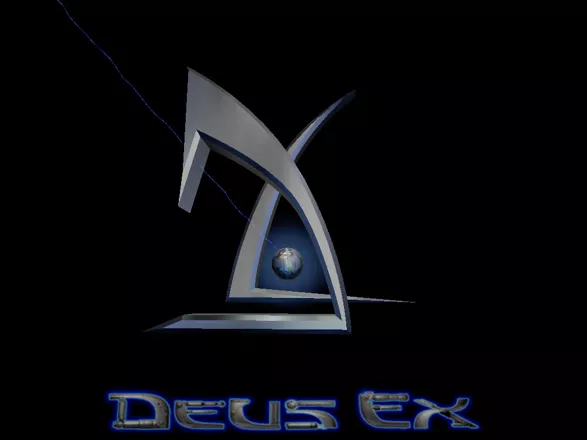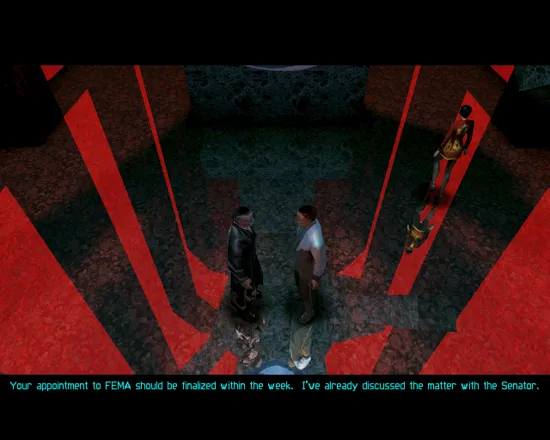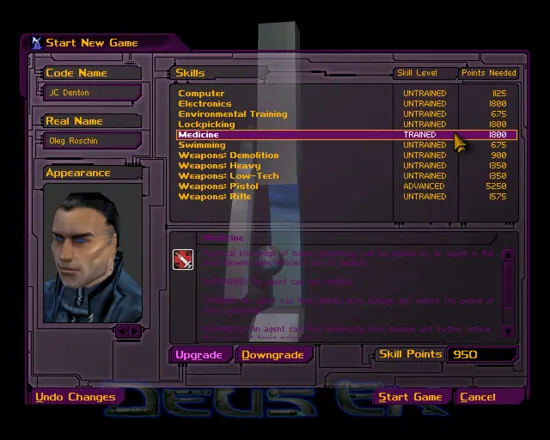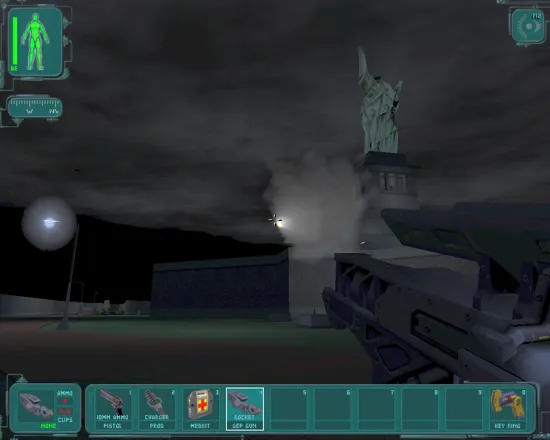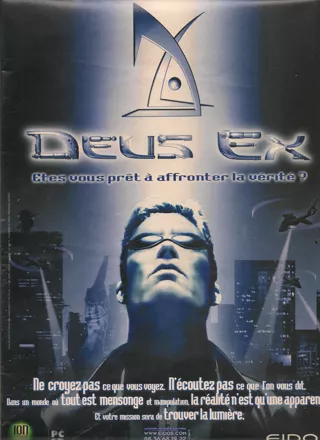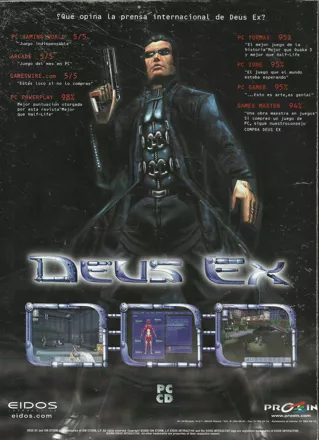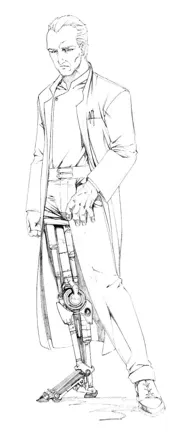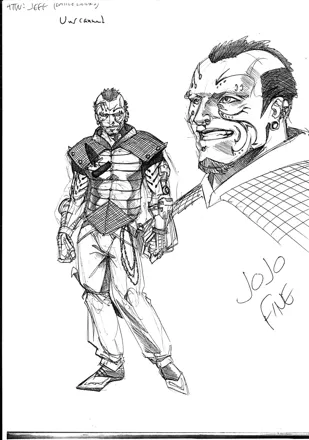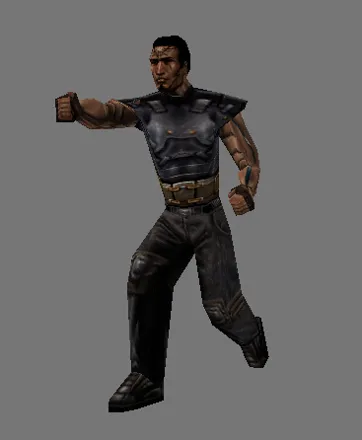Deus Ex (2000) - MobyGames (original) (raw)
aka:DX1,Deus Ex: The Conspiracy
- Overview
- Credits
- Reviews
- Covers
- Screenshots
- Videos
- Promos
- Trivia
- Specs
- Releases
- Patches
- Prices
- Forum
- Contribute
Moby Score
8.2
#1,044 of 26.6K
Critics
89%(79)
Players
(551)
Review Ranking
Collected By
814 players
Note: We may earn an affiliate commission on purchases made via eBay, Amazon and GOG links (prices updated 7/6 3:25 AM)
Add-on (unofficial)
Special Edition
Description official descriptions
Some time during the 2050's, the world is a dangerous place as terrorists, drug czars, and outlaw states rule, using violence and subterfuge as tools in their push for global conquest. A deadly virus dubbed "gray death" is running rampant throughout the world and the only known cure is a chemical known as "Ambrosia" manufactured by the VersaLife corporation. However Ambrosia supplies are scarce and world governments, particularly the United States, carefully monitor and control who receives this cure. As protest against these events, French terrorist organization "Silhouette" bombs the historic symbol of friendship between French and American people, The Statue of Liberty. In response to this attack, the United Nations Anti-Terrorist Coalition (UNATCO) organization is formed. Building a headquarters underground at Liberty Island, its mission is to attack terrorism and maintain peace around the world. JC Denton is a nano-enhanced agent who has been primed for UNATCO service. While JC's brother Paul is already an active agent, JC is beginning his first day of service when the National Secessionist Forces (NSF) suddenly raid a supply of Ambrosia at UNATCO headquarters.
Deus Ex is a dark cyberpunk game that combines gameplay styles of first-person shooter and RPG, with elements of stealth and puzzle-solving. The player assumes the role of JC Denton, UNATCO anti-terrorist agent. Pitted against an elaborate global conspiracy, he must interact with characters, pick up weapons and complete objectives. While JC is essentially fixed within the mission-framework of the game, he can be customized in areas such as weapons, technical skills and physical prowess. Completing objectives rewards the player with skill points, which may be distributed to increase JC's proficiencies in eleven different disciplines. The player can choose to increase the damage JC inflicts with various types of weapons, improve his lock-picking or computer hacking abilities, etc. Each such discipline has four levels of proficiency.
Another way of customizing JC is applying nano-augmentations to his body. These cybernetic implants bestow the hero with super-human abilities, and can be installed on different body parts, up to nine at the same time. Along with combat-related benefits, nano-augmentations also grant JC abilities that can be used to overcome certain obstacles within the game world. Examples of those are jumping to extreme heights, swimming, lifting heavy objects, etc. Weapons can be customized as well: their range, accuracy, and magazine sizes can be increased, and they can be enhanced by attaching scopes, silencers, or laser sights to them.
The game leads JC to various places all around the globe. The cities he visits, as well as most mission areas, are expansive and fairly open to accommodate different approaches to solving the same problems, depending on the player's preferred style of play. Most of the missions can be tackled in various ways, e.g. with brute force, stealth, or extensive usage of lock-picking and computer hacking abilities. At certain points, the course of the storyline can also be influenced by the decisions made by the player. Similarly to System Shock games, the environment is largely interactive, the player being able to pick up, use, and discard various types of objects.
Spellings
- デウスエクス - Japanese spelling
- 杀出重围 - Simplified Chinese spelling
Groups +
- 3D Engine: Unreal Engine 1
- Deus Ex series
- Eidos Premier Collection releases
- Gameplay feature: Body dragging
- Gameplay feature: Character development - Skill distribution
- Gameplay feature: Drowning
- Gameplay feature: Grid Inventory
- Gameplay feature: Multiple endings
- Gameplay feature: Radiation / radioactive poisoning
- Games with 451
- Protagonist: Cyborg
- Setting: 2050s
- Setting: City - Hong Kong
- Setting: City - New York
- Setting: City - Paris
- Setting: Country - France
- Setting: Passenger plane
- Setting: Ship / Boat
- Software Pyramide releases
- Theme: Hacking / Pseudohacking
Screenshots
Promos
Videos
Credits (Windows version)
185 People (145 developers, 40 thanks) · View all
Reviews
Critics
Average score: 89% (based on 79 ratings)
Players
Average score: 4.0 out of 5(based on 551 ratings with 34 reviews)
A fantastic port, but not without its flaws
The Good
The appeal of Deus Ex is that the game can be played however you want to play it. The developers have even stated it's possible to go through the entire game without killing a single person. This feature combined with a gripping storyline and fantastic atmosphere make for quite possibly one of the greatest games of all time. If you want to go more in-depth with the games good features, the reviews of the PC version will be able to go into more detail than I can.
The Bad
The game is a port to an inferior system, so obviously it will have its flaws. For starters, the graphics, while improved in some ways, are lacking in others. A few areas have been cut or modified from the original game to improve framerate. You won't notice this if this is the first time you've played Deus Ex, but if you've played through the PC version these exclusions will be apparent in a few places. The framerate will also suffer if you're involved in a fairly heated battle. It's not too bad, but it is noticeable.
The controls have been modified, since the Playstation 2 doesn't ship with a keyboard and mouse. This could be a good or bad thing, depending on how you like your FPS controls to be set up the Playstation 2 controller. I found the setup a little rough at first, but it will be second nature within a few hours of play.
A problem with the original game that wasn't fixed in the port is the "free-form" gameplay. There are few "unique" ways to go through missions. When the game says you can solve problems any way you like, it usually means "hack this", "go through this vent", or "kill this enemy". It's not a big problem, and likely not one you'll notice until a few playthroughs.
The Bottom Line
Deus Ex: The Conspiracy is a pretty good port of an already classic game. If your PC lacks the power to play Deus Ex at a reasonable speed, the PS2 version is a good substitute.
PlayStation 2 · by Eric Hess (3) · 2005
A great experience with its flaws
The Good
Deus Ex introduces a large world filled with people and their different interests. The game doesn't judge anyone and you'll never get a Game Over message because of a decision you made. Naturally you won't be able to help everybody as some interests collide, yet without doing everything you'll still get over 10 hours of gameplay on your first run (you'll surely return for a second run).
The story of the game is long and interesting, and even just for that you'll keep playing till the very end, where you have to take a side and choose from three possible endings.
The game tries to give you as much freedom as possible within the boundaries of storytelling, and does a good job at that most of the time. You have 2-3 ways to approach each objective which you can choose from depending on your preference and skills you've acquired.
Deus Ex awards the player with skills point and augmentations - electronic upgrades to the player's body. This lets the player have full control over the development of the character and direct resources only to what he or she wants. Not all augmentations can be applied to one player, and together with the multiple plot and approach choices you get a game worth playing more than once.
The Bad
The biggest issue with Deus Ex is the AI. Even though it's not a game focused on stealth like Thief or Metal Gear Solid, you can't help but laugh sometimes at the stupidity of the enemy. An enemy soldier can stare at you for a few seconds before deciding to take action, and once he decides to engage you he just strafes a lot while shooting. Also if an enemy soldier happens to hear you for a brief moment, he'll just mumble to himself something and won't bother inspecting the situation. The lack of proper AI - in addition to no award for taking the stealth approach - makes the game a case of using the stupidity of the enemy for butchering an entire army one soldier after the other.
Deus Ex has a fair share of bugs, although they aren't critical and won't mess with your experience. Still after playing with the latest patch I can't help but feel the game rushed to release before going through final tweaks.
Although the game tells a good story and keeps you hooked in, most characters are shallow and the death of someone won't change the tone of the game. The often bad voice acting doesn't help make it better.
The Bottom Line
Deus Ex is a recommended experience to anyone - action, adventure, stealth and RPG players - but has a decent amount of problems. Luckily those problems can be easily overlooked as they are mostly minor, and you still get the most important thing - solid and appealing gameplay.
Windows · by Solid Flamingo (1430) · 2007
Despite few flaws, one incredible game.
The Good
Involving storyline. Excellent, challenging gameplay. A lot like SS2 in terms of gameplay, but the environment is much better. Offing corrupt bureaucrats hellbent on world domination (hopefully not too much of a spoiler) is much more gratifying than killing pseudo-zombies. You aren't some god character who can blast through areas Doom-style, a welcome change from the "realism" some games claim to have (Nam comes to mind). All the basic aspects of games are outstanding in Deus Ex.
The Bad
The game likes to hold your hand with periodic transmissions and datapads with top secret info left lying around in places that just make no sense. AI is pretty weak, better than a lot of games, but still enemies just do things that the game acts like they can handle but can't. Shooting an enemy and then taking cover causing them to not know where you are when they clearly should, for example.
The Bottom Line
Great meshing of FPS and RPG with an incredible and interesting storyline. Do not not play this game!
Windows · by mike huch (2) · 2001
[ View all 34 player reviews ]
Discussion
| Subject | By | Date |
|---|---|---|
| Genres | Cantillon (94844) | May 7, 2021 |
| 20th anniversary | Patrick Bregger (315751) | Jun 22, 2020 |
| First original US box design? | sndwv | Aug 28, 2016 |
| Did you know? | Donatello (466) | Jun 23, 2013 |
| Happy birthday! | Patrick Bregger (315751) | Jun 24, 2010 |
Trivia
1001 Video Games
The PC version of Deus Ex appears in the book 1001 Video Games You Must Play Before You Die by General Editor Tony Mott.
Alex Denton
Somewhere in Area 51 (the last stage of the game), there is a number of containers with clones in suspension. One of them is called Alex Denton. Alex Denton is the lead character to the successor Deus Ex: Invisible War.
Books
Ever wonder about the books found in Deus Ex? The Man Who was Thursday by G.K. Chesterton is a real book written in 1901, and takes place in a fantasy version of Victorian England, in which anarchists take names of days of the week it has some similarities to Deus Ex. G.K. Chesterton also wrote a book about St. Thomas Aquinas whom is referenced several time in Deus Ex.
One of the many books you can read in Deus Ex is the beginning of The Eye of Argon by Jim Theis. This is a real book, considered by many to be the worst fantasy book ever written. Information about the book and the full text can be found online.
Cancelled Linux version
The Linux version of Deus Ex was supposed to be ported by Loki Entertainment Software. Unfortunately, they went bankrupt back in 2001.
Non-lethal
Due to the array of non-lethal weapon and the numerous stealth options, it is quite possible to finish the game having only killed three people. With the explotation of glitches, the number can be dropped to one.
References
- There's a register in the hotel at the Hell's Kitchen location... click on it and you will see that the last name is Hyppolita Hall... a character from the Sandman comic books.
- One of the computer passwords used in the game, "reindeerflotilla", is actually a reference to the 1982 movie Tron, where it was used by Flynn to hack into the computer network and challenge the MCP (the time when he's actually inside the Encom building).
- The helicopter pilot Jock with which J.C. Denton allies himself in the game is possibly a reference to the movie Raiders of the Lost Ark. In the opening scenes of that movie, Indiana Jones makes a getaway in a biplane, flown by a pilot also named Jock.
- Main voices of JC Denton and Agent Navarre are eerily similar to the protagonists of Nocture... as well as their general appearances.
- A couple of tidbits. JC Denton was supposed to have a famous ancestor with the Initials J.C. If you look at the game logo, you see a very stylized J and C rotating around a tiny sphere.
- Castle Clinton, as well as the Statue of Liberty, are real buildings represented in the game as playable maps.
- In the hotel, in NYC, check the guest register. One entry is, Gabriel Syme, from London, England. Syme was the title character in the novel, The Man Who Was Thursday.
Sales
The game was sold in just over 1 million copies by 2009.
Special edition
The "special edition" that was sold for $9.99 in bargain bins at Best Buy, Circuit City, Target, etc. was a one-level demo being passed off as a full retail version. Nowhere on the packaging is it mentioned the "special edition" is a demo and not the full retail version of the game.
Title
The title "Deus Ex" comes from the latin term deus ex machina (God from the machine). It was commonly used in Greek and Roman drama as an abrupt resolution to the plot.
Twin Towers
When going to the Liberty Island, the player can see the New York skyline, but the Twin Towers are missing. According to Warren Spector's Reddit AMA in 2015, they were merely omitted in error. Until that statement, there were fan theories on why this was the case, especially after the real world terrorist attacks on 11 September 2001, over a year after the game's release.
Voice acting
Lots of Ion Storm employees were used as voice actors. Tom Hall plays the villain in the game; Jay Franke, a QA tester, played the protagonist. He used to be on the TV sitcom California Dreams.
Awards
- GameSpy
- 2000 – Game of the Year
- 2001 – #18 Top Game of All Time
- 2011 – #3 Top PC Game of the 2000s
- PC Gamer
- 2000 - Game of the Year
- October 2001 - #10 in the "Top 50 Games of All Time" list
- April 2005 - #27 in the "50 Best Games of All Time" list
Information also contributed byAdam Baratz,Alan Chan,Dr. M. "Schadenfreude" Von Katze,emanjonez,Entorphane,Jason Musgrave,jeremy strope,MasterMegid,PCGamer77,Ryan Prendiville,Scott Monster,Stephen Atkinz;Tomer Gabel andWildKard
Analytics
Upgrade to MobyPlus to view research rankings and price history! (when applicable)
Related Sites +
- Deus Ex HDTP (High Definition Texture Project)
Deus Ex lives and will soon look cooler than ever in hi-res! - Deus Ex Incarnate
Check up on Deus Ex news, walkthroughs, and tips on this site. - Deus Ex Machina
See Deus Ex articles, interviews, polls, and screenshots at this site. - Deus Ex Post-Mortem (1/2)
Warren Spector and Harvey Smith speak about the development process of Deus Ex (Youtube, part 1/2) - Deus Ex Post-Mortem (2/2)
Warren Spector and Harvey Smith speak about the development process of Deus Ex (Youtube, part 2/2) - Postmortem: Ion Storm's Deus Ex
Gamasutra article by Warren Spector about the development process of Deus Ex - Something Awful review
A humorous review on Something Awful (PC version) - The Making Of: Deus Ex
A retrospective of Deus Ex at EDGE Online, provided by Warren Spector, which covers the game's development and struggles (September 11th, 2009). - The Nameless Mod
A total conversion which features the main gameplay advantages of Deus Ex with a completely new plot. Also includes full voice acting and two mostly separate story branches.
Identifiers +
Contribute
Are you familiar with this game? Help document and preserve this entry in video game history! If your contribution is approved, you will earn points and be credited as a contributor.
- Ad Blurb (+1 point)
- Alternate Title (+1 point)
- Correction (+1 point)
- Critic Review (+½ point)
- Group (+¼ point)
- Product Code (+¼ point)
- Related Site (+1 point)
- Release info (+1 point)
- Relation (+½ point)
- Tech Spec (+1 point)
- Trivia (+1 point)
- Video (+1 point)
Contributors to this Entry
Game added by rstevenson.
PlayStation 3 added by GTramp. Macintosh added by Kabushi. PlayStation 2 added by NeoMoose. PlayStation 5, PlayStation 4 added by glik.
Additional contributors: MAT, Adam Baratz, Unicorn Lynx, Shoddyan, Zeppin, Zeikman, Patrick Bregger, Plok, FatherJack, Zhuzha.
Game added June 25, 2000. Last modified June 26, 2025.
